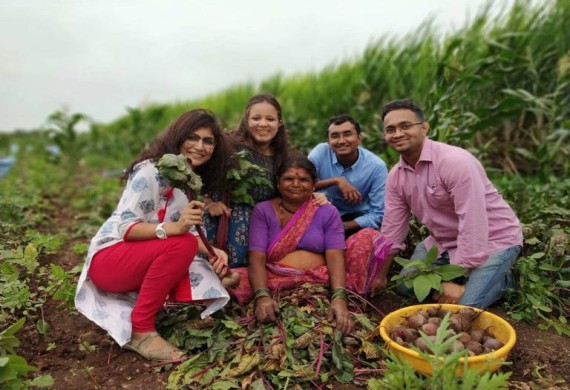
Zayed Sustainability Prize Empowers India's 60,000 Farmers and 1,200 Rural Women
By: WE Staff | Saturday, 1 October 2022
The India-based business Science for Society (S4S) Technologies has been given the Zayed Sustainability Prize, the UAE's ground-breaking international award for recognising excellence in sustainability, to help farmers and rural women reduce food waste and boost revenue.
S4S Technologies, which was founded in 2008, recognised that a considerable portion of farmers' food goes to waste because they lack the resources to preserve their crop, the expertise to sell it to a larger audience, and the technical know-how of contemporary agricultural techniques. The firm developed a cutting-edge solution - a solar food dehydrator - to solve this problem and turn food waste into non-perishable food ingredients that can be marketed.
"What brought us together was solving the challenges of food wastage, poverty among smallholder farmers and gender inequality among rural women farmers," co-founder Nidhi Pant said while marking the International Day of Awareness of Food Loss and Waste.
Farmers might reduce food waste and generate additional income by using proprietary solar conduction drier technology. The method doesn't require electricity, therefore it avoids the issues brought on by prolonged power outages while still producing sustainable outcomes.
Currently, the company's solution prevents the waste of about 22,500 tonnes of product annually and 300,000 tonnes of CO2 emissions.
"We started by providing technology solutions to farmers to reduce food wastage, but soon realised they are not marketers. Providing market linkage along with technology is necessary to integrate buyback of the processed produce," Pant noted.
S4S Technologies received $600,000 earlier this year after winning the Zayed Sustainability Prize in the "food" category. This money will be used to increase the breadth and scalability of their sustainability solution.
Although the firm has won numerous accolades for its green technologies, winning the Zayed Sustainability Prize has had a huge influence on its initiatives.
"Support from the Zayed Sustainability Prize has helped us expand our farmer-base to include 60,000 smallholder farmers and 1,200 female micro-entrepreneurs. It also helped us strengthen our value chain and farmers' awareness, training, and capacity-building," Pant underlined.
After winning a $600,000 cash incentive, the SME also digitalized its value chain. Digital tools have resulted in more instruction on quality standards and better price. In addition, S4S Technologies has added pulses, grains, spices, and coconuts to its product line after obtaining the Prize money.
33 percent of rural women work in agriculture, according to official data from the Indian government. S4S Technologies prioritises women in its business decisions and gives them chances. Chayya, a young woman with a physical impairment from a small town outside of Aurangabad in the Maharashtra state, is one illustration of the company's success. She put a lot of effort into her work as a farm labourer, but her life was challenging and her salary was barely enough.
Chayya's life drastically improved when S4S Technologies began enlisting neighbourhood women in her town to assist on a food-saving campaign. She was paid more, held to higher standards of work, and was treated with more respect in society and at work.
Her success inspired other rural women to take up the task of processing food.
"Since I started this journey, the most profound moments have been how our intervention has transformed the lives of our women entrepreneurs. I feel content when I see how our entrepreneurs have become better decision-makers – both at household and community level. With increased income, they can support education for their daughters and no longer need loans from unscrupulous loan-sharks to support the children and elderly," Pant said. "In the next five years, we aim to enable 10,000 more women to become micro-entrepreneurs and increase their profit by 50 to 200 per cent, and to work with three million farmers in reducing post-harvest losses and provide adequate market linkage."
Each year, the company hopes to save up to 175,000 tonnes of food and avoid emitting 1.2 tonnes of CO2.
"This can be done by preventing food wastage, minimal logistics, and switching to clean energy for food processing. If we stopped wasting food, we could cut global emissions by 8 per cent, free up land and resources, and save enough food to feed two billion hungry people," Pant added.
The innovative food dehydrator developed by the winning start-up reduces food waste among farmers and boosts their income.


.jpg)



